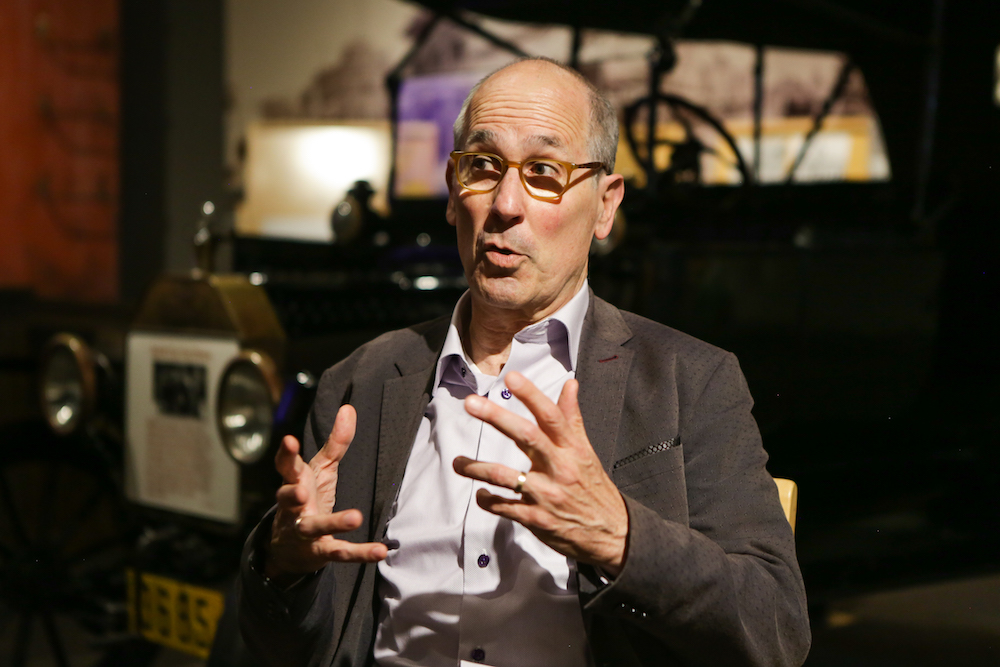
Photo by Ronnie Esparza.
Gary Gerstle is a political and social historian of the 20th-century United States with a particular interest in ethnicity, race, and nationhood. Since 2014, he has taught at the University of Cambridge, where he is the Paul Mellon Professor of American History. His prize-winning books include American Crucible: Race and Nation in the Twentieth Century, and Liberty and Coercion: The Paradox of American Government from the Founding to the Present. Before joining the panel at a Zócalo/National Steinbeck Center event entitled “Did Americans Ever Get Along?” in Salinas, California, he talked in the green room about the best American states, the differences between the different Cambridges, and the dead labor leader he would have loved to meet.
We’re in Salinas. What’s your favorite type of lettuce?
Red leaf.
What is your earliest childhood memory?
Having the mumps.
What was the last book you read?
The Cut Out Girl, by Bart van Es. Just finished it two days ago. It’s a great book.
What figure in American history, living or dead, would you most like to meet?
John Llewellyn Lewis, head of the CIO [Congress of Industrial Organizations], in the 1930s, then the insurgent labor federation. Tough Welshman, cantankerous, suffered no fools. But he did a remarkable thing in forming the CIO [which helped organize millions of industrial workers].
You write in Liberty and Coercion about the power of American states. What’s your favorite state?
Massachusetts.
What’s your least favorite American state?
This will get me in trouble. Mississippi.
Does the United States have a model state?
At different moments it has had model states. In the late 18th century, it was Virginia. In the early 20th century during the era of reform, it was Wisconsin, New York, and, to a certain extent, California. And then I suppose if you want to take a different kind of model, a secessionist model, South Carolina.
How about today?
On the two sides of the spectrum, the model of how to make a conservative state—Wisconsin under Scott Walker. That’s their showcase. For the possibilities of progressive legislation, it’s California.
You were previously at Vanderbilt. What do you miss most about Nashville?
The musicians. There are more guitar players per acre there than anywhere.
You have resided in both Cambridge, Mass., and Cambridge, England. What’s the biggest difference between them?
Age. Cambridge, England, is 800 years old, and Cambridge, Mass., only 400 years old. My graduate students, I brought them to Harvard once, and they were unimpressed—not even 400 years old.
What’s best place to eat in Cambridge, England?
Navadhanya, a restaurant with an unusual form of Indian cuisine.
And in Cambridge, Mass?
The place I like the most is Harvest.
Why are Americans such suckers for British accents?
It’s a beautiful set of accents. As music, British speech—and not just upper-crust speech—has a depth, timbre, and articulation that American speech doesn’t have. There’s kind of a clarity to it. And American speech is often muddy by comparison.
A related question: Why are Americans such suckers for the royals?
There’s a longing in this country for a symbol of nationhood that is above politics. And the royal family embodies something enduring about the British nation. The nearest things we have to that are the Constitution, and the Declaration of Independence, but those are pieces of paper. So, the American fascination with the royals is one of the ways in which Americans express their frustration with democracy and the idea of the people being in charge. The fascination is remarkable given how shoddy the history of this royal family is.
Who is your favorite British royal?
It’s gotta be Markle. I love the idea that there’s interracialism in the royal family. She’s got a bit of Diana in her, and anything that shakes up the House of Windsor is good. I will add that I’ve been living there longer than she has. She followed in my footsteps.



